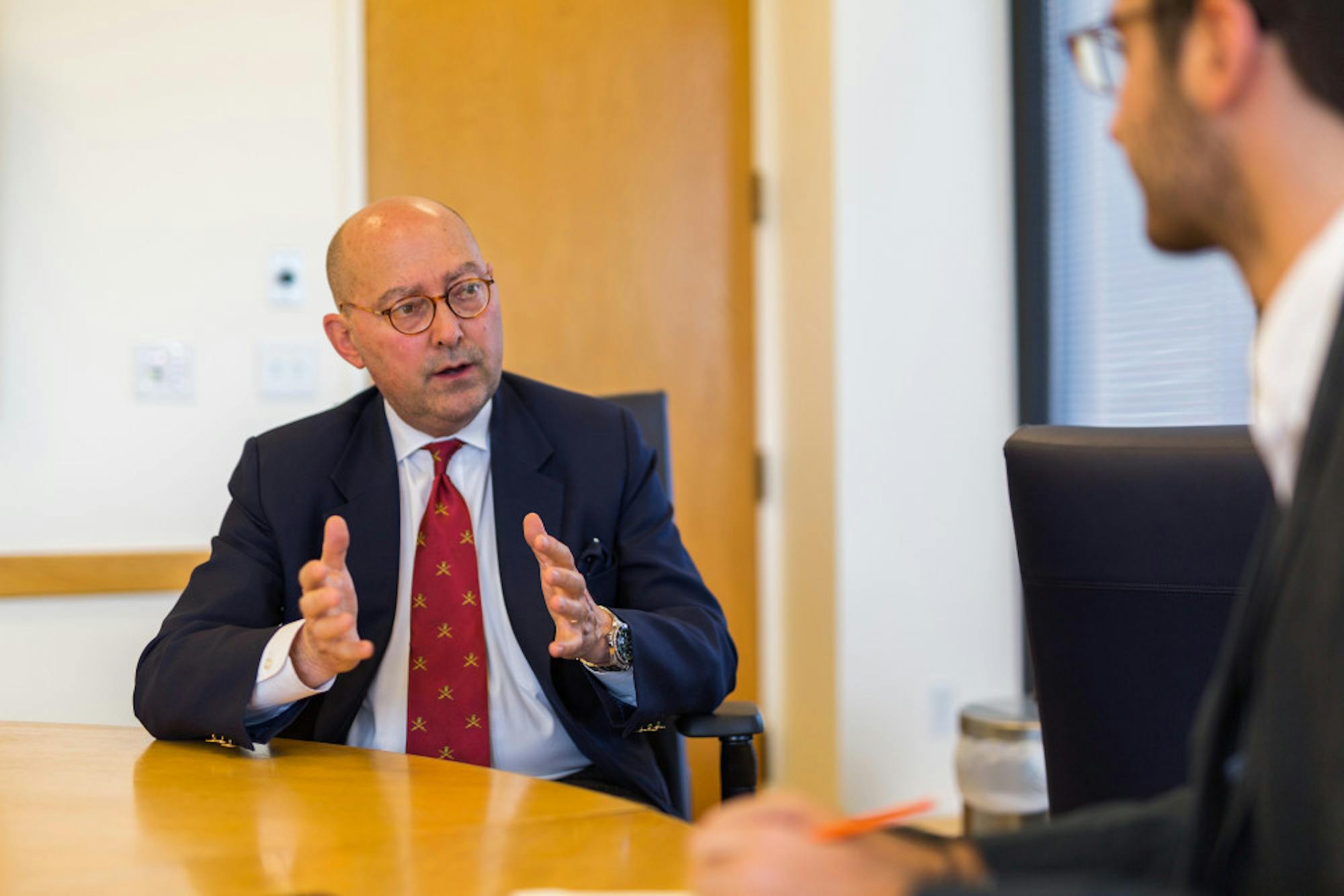Dean of The Fletcher School of Law and Diplomacy James Stavridis, a retired United States Navy admiral who served as the Supreme Allied Commander at North Atlantic Treaty Organization (NATO), co-authored "The Leader's Bookshelf" (2017) with R. Manning Ancell. Published in March through the Naval Institute Press, the book lists 50 works of literature based on the suggestions of over 200 four-star military officers, along with leadership lessons that can be drawn from the text. Stavridis, who spent several years working on the project with Ancell, believes that leadership can be strongly influenced by the books one reads. On Wednesday, Stavridis sat down with the Daily to discuss his book and current events. The interview has been edited for brevity and clarity.
The Tufts Daily (TD): Was your inspiration for this book based on your experiences in academia and also in the military, from those reading lists or from your conversations with other military officers?
James Stavridis (JS): The inspiration for the book really derived from many conversations with friends and peers during the course of my career in the military. We spend a lot of time in the military thinking about history, thinking about biography, thinking about the lessons of leadership. And as I came along in my career, I was exchanging book ideas with lots of different folks, and over time, the idea of compiling all of that into a list that might be of use to others seemed to make some sense.
TD: At the beginning of the book, you had a bit of an introduction, and you mention your daily routine of media consumption. Much of what we read is from the media every day. I know there's been a lot of information out now about "alternative facts." Has your media diet changed in any way?
JS: I believe that the places I go for my information remain pretty good. And I'll start with The Economist magazine, which is published weekly and is an excellent global compendium. I read The New York Times. I think it's quite fact-based and has very high journalistic standards. In terms of online resources, I use a wide variety, and I think that's the best way, because you can sort of fact check against other sources. But I like The Huffington Post, and I like The Daily Beast. I look quite a bit at Foreign Policy, and I like Time magazine online.
TD: What time period of your career were you able to read the most?
JS: I read the most when I was assigned to ships at sea, because -- as everyone would appreciate -- ships operate when they get close to land, but you have a lot of transit time. And it's not like an airplane, where you can just be on an airplane for five or six hours and go from San Diego to Hawaii. It takes a ship like five days to do that. And so there's always opportunity for reading in quiet moments and, perhaps more importantly, to reflect on what you've read and to take notes and to converse with others about it. So I'd say, while on sea duty, which was about half of my 37 career years in the military.
TD: Later on in the book, you mentioned that a lot of younger military officers are being discouraged from publishing more and more, and you had said that that was a negative trend. Can you elaborate on that?
JS: It worries me a little bit that there is a strain of thought out there that says, ''Hey, if you publish, you're sort of getting out of your lane, you're bucking the system, you're putting yourself out there." And boy, I disagree with that. I think the qualities we would like in any young person include the courage to publish, the courage of their convictions, whether popular or unpopular, and a desire to share their ideas with others. And so, I worry when a big, heavy institution like the military in any way suppresses that. And so, in the course of my career, I published quite a bit. I do everything I can to encourage young officers and young people to publish.
TD: In terms of recent events, one thing that I've noticed across the board is a rise in authoritarian leadership in a lot of ways, and I know that definitely conflicts with the servant leadership that you've promoted in the book. North Korea obviously comes to mind, and in Turkey a few days ago, constitutional reforms were passed. What is your opinion of those, in light of the leadership that you've promoted?
JS: I worry a great deal about this rise of authoritarianism, and I think we ought to be mindful of that. About 100 years ago, the world comes out of World War I, and after a series of controversial decisions, both economic and political, we see the rise of authoritarian leaders. We see the rise of fascism in places like Germany, Japan and Italy, nations that had deep culture and history, and it was a shocking turn of events. And I think none of that is impossible to imagine. A book that I think is worthwhile thinking about in that regard is Winston Churchill's "The Second World War" (1948), which was the epic story of how the world had to beat back authoritarianism in the form of fascism. And when you read that book and see the effort that it takes to overcome authoritarianism once it's in power, it's an extreme cautionary tale to all of us who treasure democracy that we should do all that we can to ensure that those kinds of regimes don't rise.
TD: On the more domestic side, you met with President Donald Trump, after he was elected, in Trump Tower. I believe you spoke about some foreign policy issues and cyber issues. Coming from a president who has famously said that he doesn't have much time to read, do you think you could pick out one book in particular from the 50?
JS: Here, I would really direct you to a piece that I wrote in Foreign Policy. There are actually five books on the list from "The Leader's Bookshelf" that I recommended to President Trump, but I'll put at the top of my list that he should read "Team of Rivals" (2006) by Doris Kearns-Goodwin, which is about Abraham Lincoln. And in my view, every American president has to be measured to Lincoln, for all the obvious reasons, and one of the many things Lincoln did very well from a leadership perspective was that he built a team of rivals. He was unafraid to reach across the political spectrum to get things done. I think that would be a good lesson for President Trump, and I hope he reads the book. And if he doesn't want to read it, he can listen to it on audio tape. Or, he can read the summary in "The Leader's Bookshelf."
TD: Also featured in the book are Secretary of Defense James Mattis and Secretary of Homeland Security John Kelly, friends of yours. How do you feel that their experiences and maybe even their book suggestions have influenced their positions today?
JS: I think they are two of the best-read people I've ever met. They both have extensive personal libraries, they both draw on the lessons of history extensively, they both have a good sense of humor, and I think both of them are terrific leaders who resonate to the ideas in the "The Leader's Bookshelf." And I think they're both off to a pretty good start in two very difficult jobs.
TD: I know President Trump had sort of a different foreign policy earlier on.
JS: He seems to be coming toward the center, and I think that's a good thing for the country.
TD: Finally, do you have any particular suggestions for college students from "The Leader's Bookshelf" or from your personal repertoire?
JS: I'll give you two. One is a classic that many of you will have read, but go back and read it again, and the book is "To Kill a Mockingbird" (1960) by Harper Lee, which is a story about a trial in the South. But it's also a story about human nature, about parenting, about racial issues, about justice, what really matters. It's a very powerful book by a woman of deep, deep character. The second book I'd recommend is from the 19th century, and it's Mark Twain's "A Connecticut Yankee in King Arthur's Court" (1889), which, on the surface, is a story about an engineer scientist who goes back a thousand years in time and lands in King Arthur's court. And of course, by definition, he's the smartest person in the world. He has all this scientific knowledge, he knows the world is round, he knows it's not flat. He's brilliant. But, he can't convince anybody, and he has no real means of driving innovation. And it's a book about how hard change is and how difficult innovation is and also how hard it can be to be the one who knows the right answer in a world that doesn't seem to be listening. That's a pretty powerful scenario to put yourself in. So there's a couple of books for Tufts readers. And some will say, "Well, I read it already." I think re-reading books is a powerful thing, because every time you open a book five years later, you bring five years more experience in life to that book, and that makes it a better book and makes you a better reader.
Q&A: James Stavridis on his new book 'The Leader's Bookshelf'

In an interview, Dean of The Fletcher School of Law and Diplomacy James Stavridis, discusses his latest book 'The Leader's Bookshelf' and current events revolving around it at the Cabot Intercultural Center on April 19.





